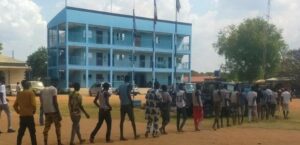Security forces in Juba are arresting young men under the guise of cracking down on gangs, only to forcibly conscript them into the military and deploy them to conflict zones, according to lawmakers and families.
The allegations follow a series of coordinated raids in recent weeks across Juba neighborhoods, including Gumbo Sherikat, Munuki, New Site, Gudele, Suk Zande, Hai Baraka, and Jebel Yesua.
Samuel Buhari Loti, a national MP representing Torit, said on Monday that detainees—particularly those unable to pay hefty bribes—are being transported to training camps in Upper Nile State, a region embroiled in violent clashes.
“The so-called crackdown on ‘niggas’ has gone beyond gangs. Now, our young people are being harassed, arrested, and some even killed. Many are disappearing,” Loti told parliament.
“Those who can’t pay are reportedly taken away, recruited, and later appear in Malakal as soldiers. This is deeply troubling.”
Families report being asked to pay between 100,000 and 500,000 South Sudanese pounds (SSP) to secure their children’s release—a sum far beyond most in the struggling economy, the lawmaker said.
Loti called on the transitional legislature to summon security chiefs for questioning. “These incidents are unchecked,” he said. “When we ask who ordered this, they say: ‘The orders come from above.’”
The operation reportedly began after a rape incident in Gumbo Sherikat last month but quickly escalated into mass arrests.
James Karlo, whose 16-year-old son was arrested and later reportedly sent to Nasir, a hotspot for fighting, revealed to Radio Tamazuj that he was told the transfer was part of a “government initiative.”
“When I went to the police station to look for my son, people there told me he had been transferred to Nasir as part of a government initiative,” he said.
“I was not comfortable with that decision. Individuals involved in crimes should face courts—not be sent to a warzone,” he added.
Police Spokesperson James Monday Enoka defended the crackdown, saying it targeted “those actively committing crimes,” including armed assaults and rapes.
“We are not arresting random youths. Those with evidence against them face legal processes; innocent ones, like students, are released,” Enoka said.
He denied the accusations that some of the detainees were being sent to conflict zones.
South Sudan’s laws and international obligations clearly prohibit forced recruitment into the military and the recruitment of anyone under 18, especially in armed groups.
Local human rights organizations have been calling on the security forces to disclose the whereabouts of missing detainees.
Radio Tamazuj could not independently verify the forced recruitment claims and the military training camps, but multiple accounts from families, officials, and activists suggest a pattern of disappearances following arrests.




